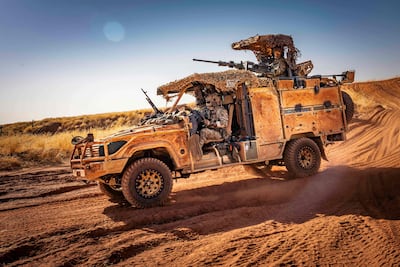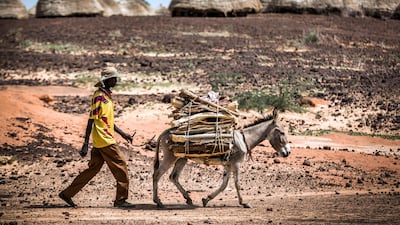Migration from the Sahel region is one of the main threats Nato is currently facing, officials said, as the alliance rounded up a historic summit in Madrid on Thursday.
The alliance's southern neighbourhood, particularly the Middle East, North Africa and Sahel regions, has faced interconnected security, demographic, economic and political challenges over the years.
“Instability beyond our borders is also contributing to irregular migration and human trafficking,” a Nato official told a press briefing attended by The National.
Climate change, fragile state institutions, health emergencies and food insecurity have all contributed to the flow of migration.
"It provides a fertile ground for the proliferation of non-state armed groups, including terrorist organisations,” the official said.
“It also enables destabilising and coercive interference by strategic competitors,” he said.
In 2020, the Sahel region was mentioned for the first time in a Nato summit communique.
"Our heads of state noted jointly in this declaration that the deteriorating situation in the Sahel region matters to native collective defence, and security," he said.
Nato has been trying to "build a stronger relationship and interest for the region that is of strategic importance for many of our allies" the official said.

By working with allies in the region Nato is a part of alleviating the problem of migration.
"Nato’s deployment in the Aegean Sea has helped curb illegal and dangerous human trafficking, together with Greece, Turkey, and the EU," Nato said.
The alliance has a centre for the south in Naples, Italy, to "improve our ability to anticipate regional crises and respond to them quickly".
For years Nato has been helping its allies in the Middle East and North Africa to build up their own defence capacities.
During the Madrid summit Spain urged its Nato member states to consider a bigger role for the alliance in North Africa and the Sahel.
Nato's leaders held a final summit session, focused on the south, on Thursday morning, after almost two days of talks dominated by Russia's war in Ukraine.
Spain's Foreign Minister Jose Manuel Albares said he did not rule out a Nato intervention in Mali if needed, after the alliance's summit statement cited terrorism among the "hybrid threats" that hostile powers can use to undermine its stability.
"If it were necessary and if it posed a threat to our security, we would do it," he told local radio station RNE. "We don't rule it out."






































